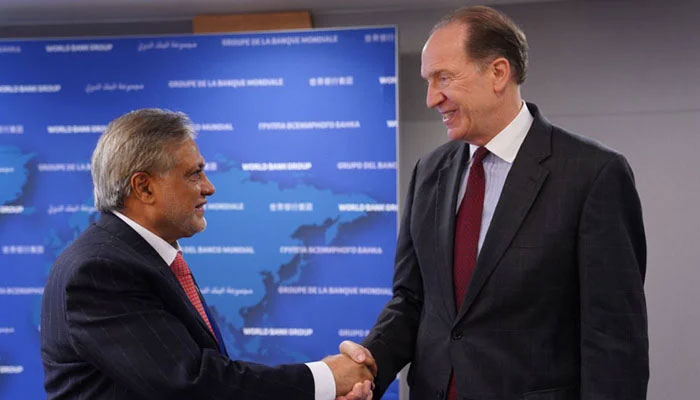WB advises Pakistan to prioritise fiscal, energy reforms to stabilise economy
WB president Malpass stresses importance of predictable economic policies to restore macroeconomic stability
World Bank Group President David Malpass has encouraged Pakistan to shift the focus on implementing Pakistan's fiscal and energy reforms to stabilise the economy and lay the foundation for sustainable growth.
The suggestion was shared in a meeting with Minister of Finance and Revenue Muhammad Ishaq Dar and Minister of Economic Affairs Sardar Ayaz Sadiq in Washington, Geo News reported.
Malpass stressed the importance of predictable economic policies to restore macroeconomic stability and market confidence in Pakistan.
He reaffirmed the Lender's ongoing commitment to support the country to help with the urgent needs in health and food sectors, provision of shelter and assistance in cash transfers.
The WB president WBG’s active engagement in raising assistance from bilateral donors, a statement issued by the bank said.
Meanwhile, a statement issued by the government of Pakistan read that Malpass also assured the ministers of continuing to work with the authorities in dealing with Pakistan's socio-economic challenges in light of floods.
The finance minister thanked the World Bank for its continued support in the socio-economic development of Pakistan. He also met Antoinette Sayeh, Deputy Managing Director, IMF. The minister apprised her of the devastations caused by the unprecedented floods in Pakistan. He shared the government's vision for stabilizing the economy and carrying out sustainable and resilient recovery.
DMD IMF appreciated the government’s policies and assured of the IMF’s continued support to Pakistan.
In a separate meeting with Vice President SAR, World Bank Martin Raiser, the finance minister thanked the WB official for undertaking a visit to Pakistan to view first-hand the devastation caused by the floods.
The visit helped in projecting the tremendous damages caused by the devastating floods, he said. The Vice President assured that the bank would continue to support Pakistan in overcoming the economic difficulties that the country was facing.
The minister met with the President of the Islamic Development Bank, Dr Muhammad Sulaiman Al-Jasser. The federal minister thanked the Islamic Development Bank for its continued engagement with Pakistan.
He appreciated that Pakistan and the bank had remained trusted partners for decades. President Al-Jasser appreciated the measures being taken by the government to stabilize the economy while providing relief to the flood victims.
In his meeting with the leadership of Deutsche Bank and J.P. Morgan, the finance minister elaborated upon the government’s vision to stabilize the economy, while also providing relief to the victims of the flood.
He assured that the government was committed to completing the IMF’s programme. The delegation also met with rating agencies and participated in several events being held during the Annual Meetings.
The delegation also engaged at the Pakistan House with a diverse group of Pakistani professionals including leading businessmen, tech entrepreneurs and others.
The finance minister is leading Pakistan’s delegation in the IMF / World Bank’s 2022 Annual meetings being held in Washington DC.
Other delegates include Federal Minister for Economic Affairs Sardar Ayaz Sadiq, Minister of State for Finance & Revenue Dr Aisha Ghaus Pasha, Governor State Bank of Pakistan Jameel Ahmed, Finance Secretary Hamed Yaqoob Sheikh, Secretary Economic Affairs Division Dr Kazim Niaz, and Additional Secretary, Finance Division Ali Tahir.
Subsidies are counter-productive: IMF to Pakistan
The remarks of the World Bank's top official regarding a focus on fiscal and energy reforms come a day after the International Monetary Fund's call for a policy shift of providing subsidies.
The IMF said it is awaiting World Bank and UNDP’s assessment report and the economic devastation as a result of unprecedented flooding in the country to determine how it can help Pakistan.
"Subsidy that is targeted to support certain items has proved not to be very effective. I would say it has proved to be very regressive," IMF's Director of the Middle East and Central Asia Department Jihad Azour said in a press briefing in Washington on Thursday.
"In our regional economic outlook, we are again looking at this issue that is showing that this is not the best way to use the very limited fiscal space that exists."
Because of this, the Fund encourages Pakistan and other countries to discontinue untargeted subsidies that are a waste of resources, he said. He also stressed that the IMF encourages countries to dedicate these resources to those who need them most.
The IMF director said it is very critical to reallocate resources for those who need them the most given the fact that challenges are mounting and the increase in prices is hurting. This is not part of IMF conditions, but it is needed to provide the right protection to those who need it during a time of high inflation, he said.
-
Amazon to appeal against Italian Antitrust fine despite major reduction
-
US lawmakers introduces new bill to define crypto market rules
-
Apple tops global smartphone market in 2025, says report
-
AI boom set to lift TSMC’s Q4 profit by 27%
-
An eye on 'global economic instability' as shares slumps, tensions intensify
-
Tesla dethroned: BYD shocks EV market as top seller in 2025
-
China sets up $8.9B fund to boost 2026 consumer goods trade-in
-
Meta to acquire Chinese AI startup Manus to expand advanced AI capabilities












